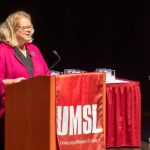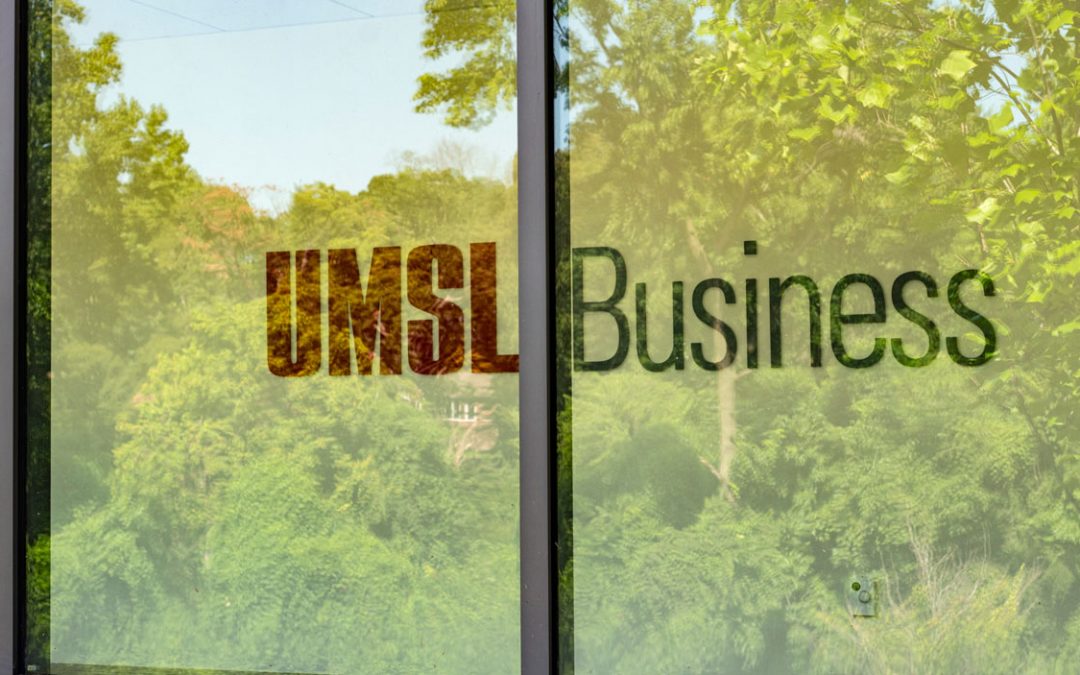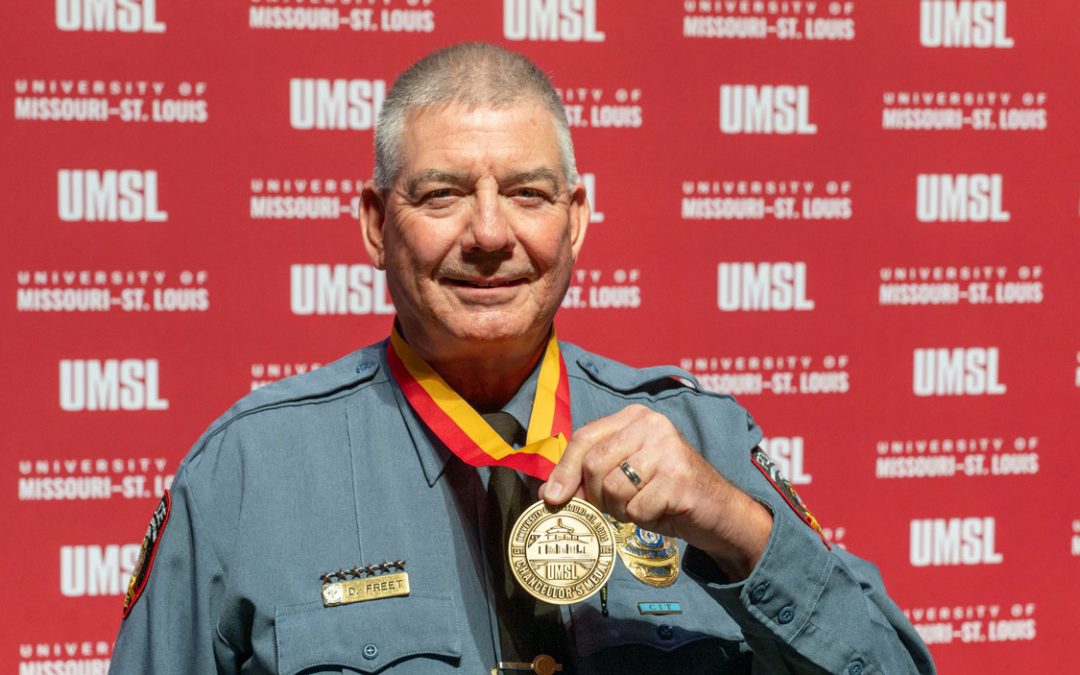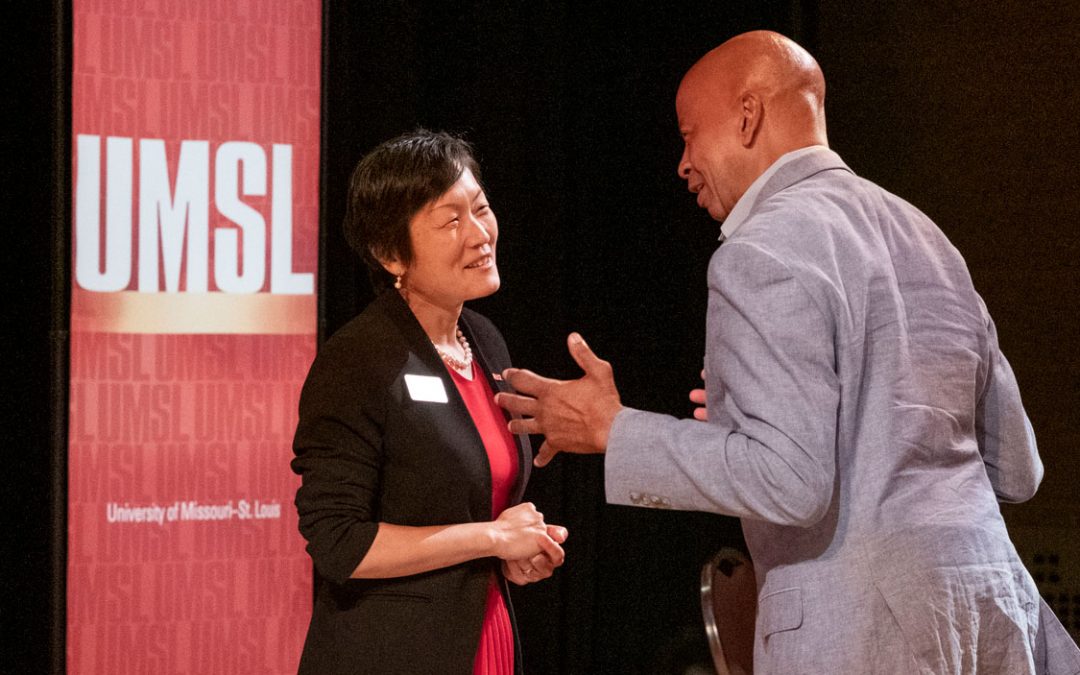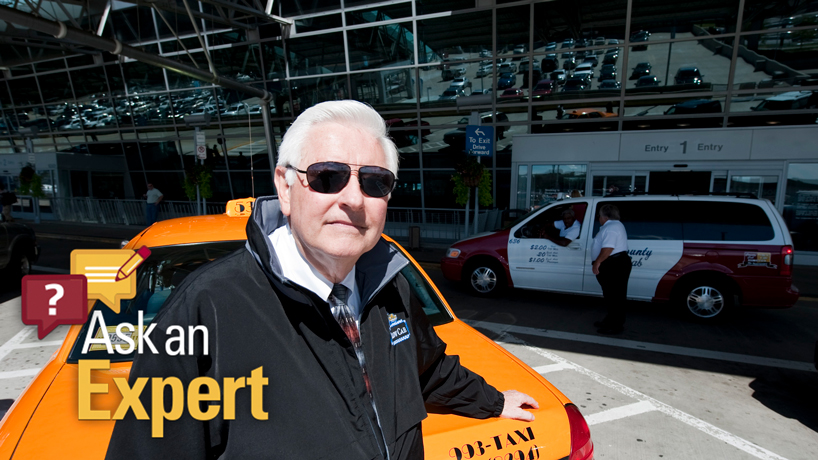
Ray Mundy, director emeritus of the UMSL Center for Transportation Studies and executive director of the Airport Ground Transportation Association, gives his take on the prospect of leasing the airport. (Photo by August Jennewein)
Last December looked like the end of the road for airport privatization in St. Louis.
After approximately two years of exploring leasing options for the region’s largest airport, St. Louis Major Lyda Krewson announced the end of her support for the effort.
But appearances can be deceptive. Privatization efforts have roared back to life as two separate bills are likely to appear on the November ballot. One, sponsored by the St. Louis Board of Aldermen and spearheaded by Board President Lewis Reed, set the minimum lease at $1.7 billion with the funds benefiting North St. Louis. The other, put forth by the St. Louis NAACP and the St. Louis-Kansas City Carpenters Regional Council, is funded in part by billionaire Rex Sinquefield. Both bills fall within a tail period that would require the city to pay consultants from the original study a percentage of profits.
Last time around, UMSL Daily sat down with University of Missouri–St. Louis’ Ray Mundy, director emeritus of the Center for Transportation Studies and executive director of the Airport Ground Transportation Association to get his take on privatization for our semi-regular Ask an Expert series. We called him up, again, to get a sense of how the new bills could change the airport’s outlook.
What do you think about the two new bills?
I thought privatization was dead and buried, having looked at some of the presentations that were made and trying to find out where they expected to make a profit. It was pretty evident that parking rates would go higher, car rental rates were going to go higher and a number of concessions were going to have to be raised in order for that proposal to make any sense.
I just have to smile – anybody in the industry will tell you that $44 million in terms of consulting fees for what work we saw was pathetic. It’s laughable, to be quite honest. The people of St. Louis should walk away from it as fast as they can. The conversion from public to private operations of the airport might be very good for the community – but not by these characters.
You think that the $44 million in consulting fees is too high?
They’re trying to pull this off as a real estate deal, and it’s not. That’s how they get to $44 million. It’s a so-called public proposal, so there should be an accounting someplace of hours worked by whom and how much they were paid. There’s no way that you could spend $44 million in consulting dollars developing this proposal.
Usually, a plan is put forward and fairly well laid out to the public before any vote is taken. But the framers of this bill are so interested in falling within the 18-month window of payment of those fees that they’re trying to get a vote on promises and no real program as to how this thing is going to operate.
One of the criticisms I’ve heard is how privatization might affect quality at the airport, such as having to cut expenses in order to make profits.
With privatization of a lot of industries, airports included, comes innovation, change. The competitive desire to attract customers. A lot of the European and British airports, many private, are located close together and are available by good bus and train service so they have to compete with each other. In the private sector, innovation, that change is far more readily available than it is in any public enterprise. There are benefits to privatization. Whether that would be brought to bear at St. Louis, I didn’t see that all that much from what they were proposing.
You’d mentioned before that this might allow for the expansion of airport gates and the return of hubs. Do you feel differently?
Southwest, by definition, has a hub here, and they had to sign off on the proposal before it could be supported by the FAA. Looking ahead, it is probably an opportunity to build a larger hub, but I can’t say any other airline would say, “We’re going to make St. Louis a hub.” There’s not enough activity to pull that off.
Isn’t that a circular problem, there’s no activity because there aren’t the flights at the airport?
It’s not a destination airport, unlike many other airports, which typically have their own hotel within the facility itself, shopping centers. We just had a meeting up in Portland, Oregon, that has a relatively new and expanded airport facility, and it’s actually a center for regional shopping. It’s not a private airport, it’s public. So some innovation and change could actually be done with the airport remaining publicly owned by the city.
Well, it would be difficult because the airport’s debt is already leveraged. All their resources went to pay for that third runway. It’s a number of years out before they get any relief under the cap to be able to make any significant new investments. A reason in favor of privatization would be the influx of capital to make such improvements and broaden the appeal of the airport.
I’ve heard some talk about developing the unused land around the airport.
There are opportunities for much greater development around the airport, and private enterprise would have a better track record of having done this.
Is there a way you see of making those improvements without privatization?
Not unless the city wants to put money into it with the idea of getting an investment back out of it, but that doesn’t seem very plausible either given the finances of the city. So what we have is a functional St. Louis airport that is improving on an incremental basis. The aviation director appears to have started on a course that is improving as fast as I think the availability of funds allow her to do so. But there aren’t that many funds.
Do you think the coronavirus pandemic has changed the argument for privatization one way or the other?
Excellent question. I don’t know how St. Louis fared in the amount of monies being given by the federal government to the airports. Some airports got funds that were two times or more their annual budget [Lambert St. Louis International Airport received $59 million in CARES Act funds, and in FY18, had a budget of $169 million].
Without a large federal grant, it would favor privatization as being the only way new funds could be invested in the airport. With a significant government grant, one might say that the airport could have additional resources to build more capabilities for the development of properties the airport owns or expanding the terminal. St. Louis is really a good candidate for building a new terminal.
What would a new terminal do for the airport? Would it replace the existing terminals?
A complete replacement. It would certainly improve upgraded facility and lower cost. For example, you have an aging terminal parking facility that is 50 or more years old. It’s all 50 years old or more, which means that structurally it’s pretty much lived its useful life. It needs to have quite a bit of extensive renovation, or in my opinion, it would make more sense to completely flip the airport terminal to the north side of the runways and build a new terminal and parking facilities there.
The money that would be generated from privatization is earmarked for city improvements rather than the airport. One of the big criticisms, from individuals such as alderman and mayoral candidate Cara Spencer, is that it seems like a money grab and a “silver bullet” that’s going to save the city.
Full disclosure, I appeared on several programs with Spencer, and I gained a great deal of respect for her position and how she was making it. Privatization could be good for St. Louis. But not the way that they’re going about it. And not the way in which there’s a huge financial campaign to wave a billion dollars. So I agree with her on this – proponents will make all types of promises, waiving a billion dollars around, but in all probability, they are just “promises.”
Learn more about airport privatization in our original Ask an Expert feature.










